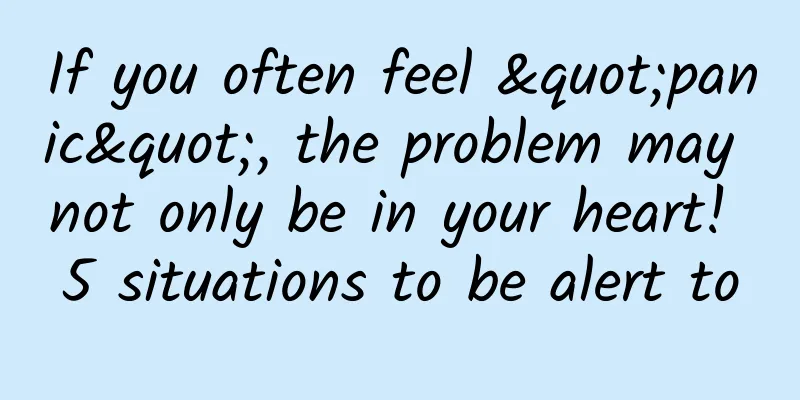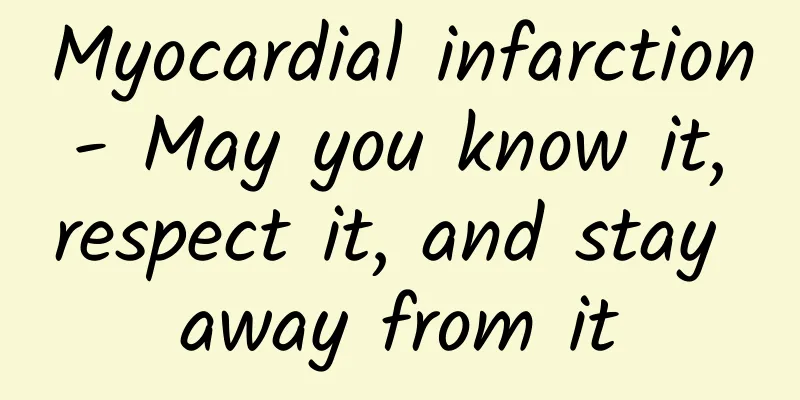If you often feel "panic", the problem may not only be in your heart! 5 situations to be alert to

|
I believe everyone is familiar with "panic", and you or people around you may have experienced it. Whether at work, in life, or after exercise, "panic" can suddenly strike and make people feel uneasy. "Panic" is a feeling as if the heart is beating extremely violently in the chest, and you can even feel the strong vibration of each heartbeat. It not only makes people feel uncomfortable, but also causes anxiety and worry. So, what exactly is “panic”? What causes us to experience “panic”? When “panic” strikes, how should we deal with it? Copyright images in the gallery. Reprinting and using them may lead to copyright disputes. What is "panic"? "Heart palpitations" are also called palpitations, which are a subjective experience of abnormal heartbeats. You may feel your heart beating violently in your chest, and even be able to clearly count the rhythm of each heartbeat. Normally, the heartbeat is stable and regular, but in some cases, the heartbeat may suddenly speed up, slow down, miss a beat, or become stronger, making people feel uncomfortable and nervous. This feeling occurs because the afferent nerves of the heart transmit continuous heartbeat information to the brain, and specific areas in the brain, such as the right insula, cingulate cortex, somatosensory motor and somatosensory cortex, process it to form the perception of heartbeat by inhibiting or releasing norepinephrine. From reference [1]: Proposed pathway for cardiac interoception/palpitations However, "palpitations" are not a specific disease, but the result of the combined action of many factors. It can occur in healthy people and may also be a sign of certain underlying diseases. What factors Will it make you panic? The causes of "palpitations" are very complex, including both physiological and pathological factors. 1.3 kinds of physiological factors cause "panic", don't worry too much "Palliance" caused by physiological factors is often related to our daily living habits and emotional fluctuations. For example, after strenuous exercise, the heart needs to speed up blood circulation to meet the needs of the body, and the heartbeat will naturally speed up. Emotional fluctuations are also an important factor. Whether it is tension, anxiety, excitement, or fear, it will lead to increased adrenaline secretion and cause the heartbeat to accelerate. In addition, the intake of stimulants such as caffeine, alcohol or nicotine can also cause the heartbeat to accelerate and cause a feeling of "palliation". The "palliation" caused by the above three types of physiological factors usually does not need to be worried. We stop the factors that cause "palliation" and recover after a short rest. 2. Be alert to the 5 kinds of pathological factors that cause panic! In addition to the above situations, frequent "palpitations" may also involve various potential health problems, which can be divided into five categories: arrhythmia, structural heart disease, psychosomatic disease, systemic disease and the influence of drugs. ① Arrhythmia: such as supraventricular/ventricular extrasystoles, supraventricular/ventricular tachycardia, bradycardia (severe sinus bradycardia, sinus arrest, second-degree and third-degree atrioventricular block), pacemaker and ICD function and/or programming abnormalities, due to the rapid, slow and irregular heartbeat, people subjectively feel the heartbeat, causing "palpitations". ② Structural heart disease: such as cardiomyopathy, valvular disease, heart failure, etc., due to problems with the structure of the heart itself, a faster or stronger heartbeat is needed to meet the body's blood supply, so "palpitations" will occur. ③ Psychosomatic diseases: such as anxiety, depression, panic attacks, etc. can also cause palpitations, which may be related to these diseases changing the secretion of alpha-2 adrenergic neurotransmitters in the brain. ④ Systemic diseases: There are many diseases that can cause palpitations, such as hyperthyroidism and pheochromocytoma that can directly regulate the heart, anemia, hypotension, hypoglycemia that require the heart to increase blood supply, etc., which can all cause "palpitations". ⑤ Drug effects: "Palpitations" may also be a side effect of certain drugs, such as vasodilators, anticholinergic drugs, and hydralazine, which can directly affect the nerves that control the heart. Understanding the common causes of "palpitations" will help us better prevent and deal with this situation in our daily lives. The following table can be used as a reference for self-control. Compiled from reference [2] What should you do when you feel panic? When panic strikes suddenly, the first thing to do is to stay calm and not panic too much. There are many reasons for panic, and most of them are not serious health problems. We just need to take appropriate measures to deal with it. 1. When you feel "panic", try to relax yourself first and avoid or stop factors that may induce panic, such as strenuous exercise, alcohol, and caffeine. 2. If you have frequent palpitations, it is recommended that you record each episode, including the time of the episode, duration, triggering factors, and accompanying symptoms. These records can help doctors better understand your condition and make an accurate diagnosis and treatment plan. 3. Generally speaking, there is no need to worry too much about occasional palpitations that only last for a few seconds each time. However, if the patient has a history of heart disease, the palpitations last for a long time, and the resting heart rate is higher than 100 beats per minute, then you need to go to the hospital as soon as possible to undergo relevant heart examinations. 4. If palpitations are accompanied by chest pain, chest tightness, pain in the arms, neck, upper back, severe breathing difficulties, dizziness or cold sweats, please seek medical attention immediately. Although panic is common, it is not terrible. Through proper self-regulation, recording symptoms, seeking medical help and taking preventive measures, you can effectively deal with panic and maintain a healthy life. Remember, staying calm and optimistic is the first step to deal with panic. References [1]KandiahJW,BlumbergerDM,RabkinSW.TheFundamentalBasisofPalpitations:ANeurocardiologyApproach.CurrCardiolRev.2022;18(3):e090921196306. [2] RavieleA, GiadaF, BergfeldtL, et al. Management of patients with palpitations: a position paper from the European Heart Rhythm Association. Europe. 2011;13(7):920-934. [3]GovenderI,NashedKK,RangiahS,etal.Palpitations:Evaluationandmanagementbyprimarycarepractitioners.SAfrFamPract(2004).2022;64(1):e1-e8. Planning and production Author: Jiang Yongyuan, Master of Internal Medicine, Third Military Medical University Reviewer: Tang Qin, Director of the Science Popularization Department of the Chinese Medical Association, National Health Science Popularization Expert |
<<: Two bad habits that make people ugly and in a bad mood. I guess you are doing them!
Recommend
Post-hysteroscopy exercise to prevent re-adhesion
In the current medical understanding, hysteroscop...
Is it good to drink honeysuckle water during breastfeeding?
Herbal tea is good for women's body. Drinking...
What is the reason for white dirt on the vulva?
Women must pay attention to the hygiene of their ...
What is the best medicine for women's tinnitus?
Tinnitus is one of the more common diseases in da...
Why is pregnancy so tiring?
Generally, women’s immunity will decrease after t...
How many months does it take for pregnant women to start using pillows?
Women are very fragile during pregnancy, and they...
What medicine to take to reduce gynecological inflammation
If women do not pay attention to personal hygiene...
Symptoms of poor embryo in early pregnancy
If the embryo is not good in the early pregnancy,...
Can I eat steak during my period?
I believe everyone is familiar with steak. We als...
Is it easy for a girl with type O blood to have hemolysis during pregnancy?
We all know that people with type O blood are mor...
Can pregnant women with cough eat pear stewed with rock sugar?
Pregnant women are prone to coughing during pregn...
What causes bleeding and stomach pain in early pregnancy?
One month of pregnancy happens to be the early st...
What are the symptoms of cervical cysts? 80% of people don’t know
There are many kinds of gynecological diseases in...
What should I check if I haven't gotten pregnant for half a year?
Some couples have not gotten pregnant after sever...
What to do if you have dry stool after cesarean section
It is very common for women to suffer from consti...









